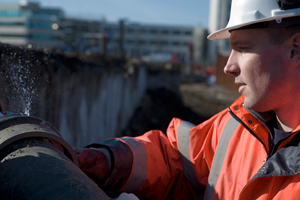Media Release - Sun-Canadian Pipeline Restart Approved
Sun-Canadian Pipeline Restart Approved
TSSA imposes strict conditions on Sarnia-Hamilton pipeline operation
FOR IMMEDIATE RELEASE (Toronto, ON, November 18, 2013) – The Technical Standards and Safety Authority (TSSA), Ontario’s public safety regulator, has granted Sun-Canadian Pipe Lines Ltd. approval to restart its Sarnia-Hamilton pipeline, which was shut down on September 10 following a rupture, under strict safety conditions, including:
- The pipeline shall be operated at a reduced pressure not to exceed a maximum of 80% of the operating pressure at the time of the September 10 incident.
- The reduced operating pressure limitations shall be programmed into the pipeline’s control system and shall not be adjustable by the operators.
- Automatic shut down shall be programmed into the pipeline’s control system and shall not be adjustable by the operator to prevent the pipeline from operating above the new maximum operating pressure.
- Start-up shall take place during daytime hours and in the presence of a TSSA inspector.
- Aerial patrols shall be conducted on the day of the start up and two days after the pipeline is restarted.
- Additional pipeline staff shall be present at the Sarnia, London and Waterdown stations on the day of the start up and on the two following days after the pipeline is restarted to ensure safe start up.
- Sun-Canadian’s formal analysis and recommendations in response to the findings of the independent analysis of the pipeline rupture shall be presented to TSSA by November 30.
- A supplementary inspection program shall be instituted for the entire pipeline. This inspection program shall be fully implemented within 60 days of the pipeline restart date and shall consist of:
Ultrasonic crack detection tool run;
Tranverse flux tool run;
- High resolution magnetic flux tool run;
- Ultrasonic metal loss run;
- Cathodic protection system evaluation by either inline or closed space survey;
- Leak detection ball run
- Results of the supplementary inspection program shall be analyzed by an independent laboratory approved by TSSA and the results of the analysis along with associated recommendations shall be provided directly to TSSA within 45 days of each test tool run.
- Any leaks, unaccounted loss of product or other test result anomalies or concerns shall be reported immediately to TSSA.
- Any recommendation arising out of the analysis of the results of the supplementary testing program shall be reviewed and acted upon within 30 days or within a time frame approved by TSSA. Any imminent risk of pipeline rupture shall be immediately reviewed directly with TSSA.
- Sun Canadian staff shall be available on a bi-weekly basis or at the request of TSSA to discuss and resolve any issues or concerns.
- Sun Canadian shall report to TSSA the progress and operation of the pipeline on a bi-weekly basis.
- TSSA will shut down the pipeline at any time if any of the above conditions have not been fully met and adhered to or if any subsequent report, inspection or analysis indicates either non-compliance with the above conditions or identifies additional risks of leaks or ruptures or if an immediate hazard associated with continued pipeline operation is determined.
Sun Canadian Pipe Line’s 360 kilometre, 8 inch, Sarnia-Hamilton pipeline ruptured on September 10, 2013, spilling approximately 35,000 litres of low-sulphur diesel, some of which entered the St. Clair River in Sarnia. The pipeline was immediately ordered shut down by TSSA and an investigation was initiated to determine the cause of the rupture and to ensure appropriate repairs were undertaken. The Ontario Ministry of the Environment has ordered an environmental remediation of the spill site.
As part of TSSA’s investigation, an independent laboratory analysis of the ruptured section of the pipeline was commissioned. The analysis conducted by ApplusRTD/Kiefner Associates, based in Ohio, USA, has determined external corrosion as the cause of the rupture. The external corrosion was not detected through Sun Canadian Pipe Line’s ongoing inspection and maintenance program due to the presence of anomalous magnetic corrosion product under locally thick coating. As a condition of restart, TSSA has ordered Sun Canadian to conduct multiple in-line pipeline inspection and testing procedures under lowered operating pressures to detect and address any other anomalies to ensure the integrity of the pipeline.
“The strict requirements imposed on Sun Canadian’s restart will ensure the pipeline is operated safely when it is returned to service,” said John Marshall, Director of TSSA’s Fuels Safety Program. “Any breach of TSSA’s requirements or any indication of excessive risk of spill or rupture will result in the immediate shut down of the pipeline. TSSA will be closely monitoring Sun Canadian operations to make sure all conditions of restart are being met and the pipeline does not pose an undue risk to the environment or to the health and safety of Ontarians,” added Mr. Marshall.
Full media release attached below.

